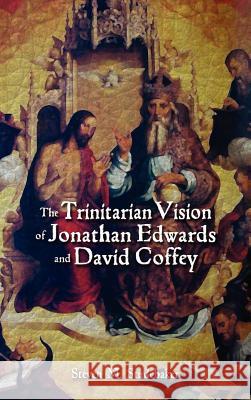The Trinitarian Vision of Jonathan Edwards and David Coffey » książka
The Trinitarian Vision of Jonathan Edwards and David Coffey
ISBN-13: 9781604977936 / Angielski / Twarda / 2011 / 370 str.
Many Evangelicals want to believe in a God who is merciful to the multitudes that never hear the Gospel of Jesus Christ, but lack the theological categories to support that aspiration. This book addresses these areas of evangelical theology by drawing on a well-known figure in the evangelical tradition-Jonathan Edwards (1703-1758)-and a contemporary Roman Catholic theologian-David Coffey (1934-). Though they may seem theological worlds apart, their use of a common trinitarian theology-the Augustinian mutual love model-led them to similar conclusions on Christology, pneumatology, and the theology of grace. Their common trinitarian vision provides resources to develop a transformational and relational vision of redemption and an inclusivist theology of religions within the evangelical tradition. The book brings Jonathan Edwards' and David Coffey's trinitarian understanding of God and redemption into ecumenical and constructive dialogue. The Trinity plays a systemic role in their theology and leads them to similar Spirit Christologies and pneumatological concepts of grace. Their use of the Augustinian mutual love model of the Trinity and their integration of it with Christology and pneumatology provide the resources to develop a transformational and relational vision of redemption and inclusivist theology of religions. To achieve its historical, ecumenical, and constructive program, the book moves through three steps. The first describes the Augustinian mutual love model of the Trinity in light of two of its major historical representatives-St. Augustine and St. Thomas Aquinas-and situates Edwards' and Coffey's thought in continuity with that tradition. The second section demonstrates that Edwards and Coffey's shared trinitarian theology led them to similar Spirit Christologies and pneumatological concepts of grace. Based on the historical and comparative work in the first two sections, the third section makes two constructive proposals. First, it presents a relational and transformational understanding of redemption in place of the traditional Protestant evangelical legal doctrine of justification and formulaic approach to spiritual formation. Second, it proposes an inclusive theology of religions that includes a positive theological attitude toward the universal human religious quest and its manifestation in various religious traditions of the world. Intended for students and scholars working in evangelical, ecumenical, and trinitarian theology, this project seeks to make a constructive contribution to contemporary evangelical theology.The book will appeal to multiple audiences. First, it is important for Edwards scholars and to readers with a general interest in Edwards since there are few book-length treatments of his trinitarianism. Moreover, and accenting its appeal, the book presents an alternative interpretation of his trinitarian theology relative to the previous books. Second, it should attract the attention of evangelical theologians interested in the doctrine of the Trinity, ecumenical theology, revising traditional evangelical views on Christ and the Holy Spirit, and developing an evangelical theology of religions. Finally, the book will be valuable to Catholic theologians interested in ecumenical theology and especially that related to Evangelicalism.











